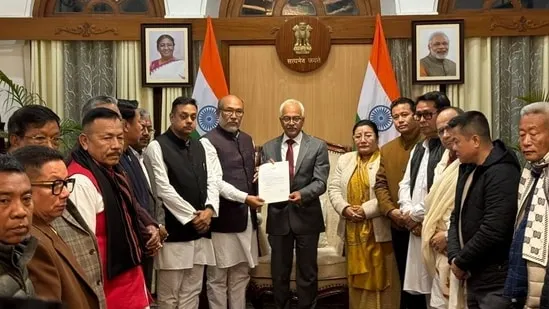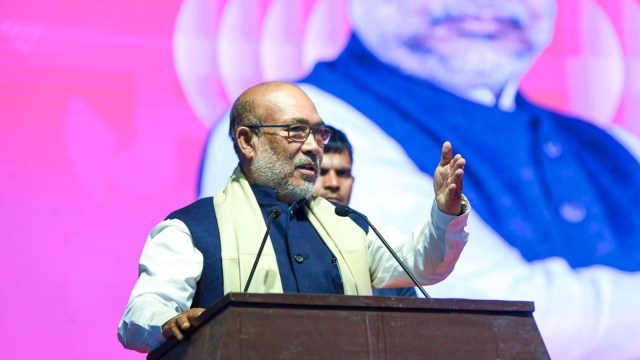

The recent imposition of President’s Rule in Manipur has garnered significant attention, following the resignation of Chief Minister N. Biren Singh. This move raises questions about the underlying causes, its immediate implications, and the future trajectory of governance in the state.
Background and Recent Developments

Manipur has experienced increasing unrest over the past few years. Ethnic tensions between the Meitei majority and the Kuki minority have led to violent clashes. Since 2023, the conflict has escalated. With over 250 reported deaths and thousands displaced, the situation has deeply affected the state.
Chief Minister N. Biren Singh, a key political figure, was under intense pressure. His tenure saw rising unrest as various groups demanded better representation and economic opportunities. The state’s instability forced him into a corner, and on February 9,
2025, he resigned. His resignation was a direct response to mounting criticism and public outcry over the government’s handling of the crisis.
Why President’s Rule?
President’s Rule is a constitutional provision in India. It is applied when a state government cannot function effectively. This step is governed by Article 356 of the Indian Constitution. Here are the main reasons behind its imposition in Manipur:
-
Inability to Govern:
The violence and political disorder made it impossible for the state government to manage day-to-day affairs. -
Restoring Stability:
The central government stepped in to restore order. With President’s Rule, the state’s governor takes charge, ensuring that the region remains stable until normal governance can resume. -
Addressing Ethnic Conflict:
The ethnic clashes between the Meitei and Kuki communities demanded urgent intervention. The central administration aims to mediate and set the stage for dialogue.
Immediate Implications
The central government’s decision to impose President’s Rule has several immediate impacts:
-
Administrative Control:
With President’s Rule, the state’s legislative assembly is either suspended or dissolved. Governor Ajay Kumar Bhalla now oversees the state’s administration. This ensures that the central government can act swiftly. -
Law and Order:
Security forces have been deployed to maintain public order. This is a key measure to prevent further violence and safeguard the lives of civilians. -
Humanitarian Efforts:
The central government is also focusing on relief measures. Displaced families are receiving support, and emergency services are being enhanced.
Future Prospects for Manipur
The move to impose President’s Rule is seen as a temporary measure. Here are the prospects and next steps for Manipur:
-
Restoring Democratic Governance:
The primary goal is to stabilize the state. Once peace returns, efforts will begin to restore the democratic process. New elections will likely be scheduled, and a stable government will be formed. -
Peace Talks and Reconciliation:
The central administration plans to initiate peace talks between the conflicting communities. Mediation efforts will focus on long-term solutions that address economic and social disparities. -
Economic Recovery and Development:
The state has suffered both economically and socially due to the unrest. Future plans include economic recovery packages. These are intended to rebuild infrastructure, create jobs, and ensure that all communities benefit from development. -
Enhanced Security Measures:
In the immediate term, increased security will continue. The hope is that, over time, this security presence will be replaced by local governance once elections are held.
How Will This Affect the People of Manipur?
The imposition of President’s Rule brings both hope and challenges. Here’s what the people of Manipur can expect:
-
Short-Term Relief:
Many hope that direct central control will curb the violence. This is critical to ensuring that everyday life can return to normal. -
Long-Term Stability:
A focus on dialogue and reconciliation aims to create lasting peace. Addressing the root causes of the conflict is essential for future stability. -
Economic and Social Reforms:
There is a promise of better representation and economic opportunities. These reforms may help reduce the deep-seated divisions that have fueled the unrest.
Conclusion
The imposition of President’s Rule in Manipur marks a critical turning point. While Chief Minister N. Biren Singh’s resignation set off a chain of events, the central government now seeks to restore order and pave the way for long-term peace. Through focused administrative control, enhanced security measures, and plans for economic and social reforms, Manipur is on a path toward stabilization and renewed democratic governance. The coming months will be crucial in determining whether this temporary measure can bring lasting change to a state in turmoil.
For more update like this, stay tuned at andhratrends.com
Related News:
BJP’s Historic Victory in Delhi Assembly Elections 2025: A 27-Year Wait Ends
Namma Metro Fare Hike Sparks Outrage: Commuters Protest 50% Increase!



